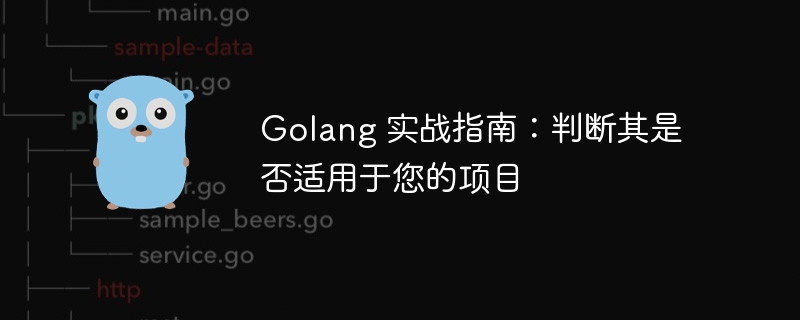Home >Backend Development >Golang >Golang Practical Guide: Determine whether it is suitable for your project
Golang Practical Guide: Determine whether it is suitable for your project
- 王林Original
- 2024-04-08 15:54:011063browse
Go is suitable for high-concurrency, resource-intensive projects. Its advantages include high concurrency, static typing, high-speed compilation, and garbage collection; but the ecosystem is limited, pointers are complicated, and generics are lacking. In practice, Go is very suitable for use in web applications that need to handle high concurrent requests.

Go Practical Guide: Determining if it’s right for your project
Go, also known as Golang, is a programming language developed by Google open source programming language. Go has exploded in popularity over the past decade due to its simplicity, high concurrency, and fast compilation speeds. However, there are several factors to consider before applying Go to your project.
Evaluate the advantages of Go
- High concurrency: Go has a powerful built-in concurrency mechanism called goroutine, which allows developers Easily write parallel programs to maximize use of CPU resources.
- Static typing: Go is a statically typed language with type safety that helps prevent runtime errors and improve code reliability.
- High-speed compilation: The Go compiler is very fast and can quickly compile and link large code bases to facilitate rapid development.
- Garbage collection: Go has built-in garbage collection and automatically manages memory, simplifying memory management and reducing the risk of memory leaks.
Assessing Go’s Weaknesses
- Limited Ecosystem: Compared to popular languages like Java or Python, Go’s The ecosystem is relatively limited, especially for certain fields like machine learning or web development.
- Pointer Complexity: Go uses pointers extensively, which can create complexity and a learning curve for developers without pointer experience.
- Lack of generics: Go currently does not support generics, which may limit code reusability and versatility.
Practical Case
Let us consider using Go to develop a small web application that needs to handle high concurrent requests.
package main
import (
"fmt"
"net/http"
"sync"
)
var wg sync.WaitGroup
func main() {
http.HandleFunc("/", handleRequest)
http.ListenAndServe(":8080", nil)
}
func handleRequest(rw http.ResponseWriter, r *http.Request) {
fmt.Fprintf(rw, "Hello world!")
wg.Done()
}In this example, Go’s concurrency feature allows us to handle a large number of concurrent requests. wg.Done() The call tells WaitGroup that the coroutine has completed, and when all coroutines have completed, the main program will continue execution.
Conclusion
Go is a powerful programming language, especially suitable for high-concurrency, resource-intensive projects. Before deciding whether to use Go, consider its strengths and weaknesses and apply them to your project's needs. Go is an excellent choice for projects that require concurrency, type safety, and fast compilation.
The above is the detailed content of Golang Practical Guide: Determine whether it is suitable for your project. For more information, please follow other related articles on the PHP Chinese website!
Related articles
See more- Golang determines whether it is a file or a folder
- A practical guide to automated web crawlers: building web crawlers with PHP and Selenium
- Vue and ECharts4Taro3 Practical Guide: How to optimize the performance of mobile data visualization
- The performance optimization effect of Golang Sync package on high concurrent requests
- Highly concurrent request processing and scheduling of TP6 Think-Swoole RPC service

